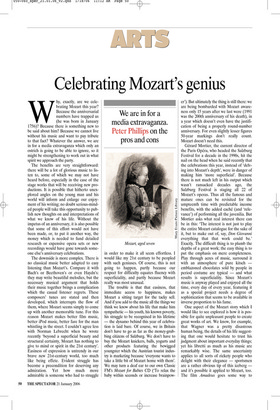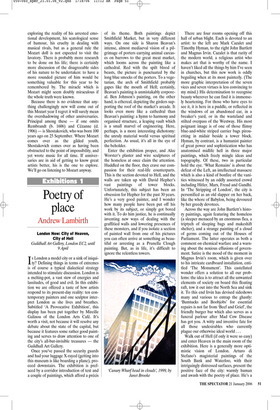Celebrating Mozart’s genius
We are in for a media extravaganza. Peter Phillips on the pros and cons
Why, exactly, are we celebrating Mozart this year? Because the anniversarial numbers have trapped us (he was born in January 1756)? Because there is something new to be said about him? Because we cannot live without his music and want to pay tribute to that fact? Whatever the answer, we are in for a media extravaganza which only an ostrich is going to be able to ignore, so it might be strengthening to work out in what spirit we approach the party.
The benefits are very straightforward: there will be a lot of glorious music to listen to, some of which we may not have heard before, especially in the case of the stage works that will be receiving new productions. It is possible that hitherto unexplored angles on the young man and his world will inform and enlarge our enjoyment of his writing; no doubt serious-minded people will take this opportunity to publish new thoughts on and interpretations of what we know of his life. Without the impetus of an anniversary, it is also possible that some of this effort would not have been made, or, to put it another way, the money which is needed to fund detailed research or expensive opera sets or new recordings would have gone towards someone else’s anniversary celebrations.
The downside is more complex. There is no classical music better adapted to easy listening than Mozart’s. Compare it with Bach’s or Beethoven’s or even Haydn’s: they may write beautiful melodies, but the necessary musical argument that holds their music together brings a complication which the casual listener regrets. These composers’ tunes are stated and then developed, which interrupts the flow of them, where Mozart seems simply to come up with another memorable tune. For this reason Mozart makes better film music, better iPod music, better fare for the man whistling in the street. I couldn’t agree less with Norman Lebrecht when he wrote recently ‘beyond a superficial beauty and structural certainty, Mozart has nothing to give to mind or spirit in the 21st century’. Easiness of expression is untrendy in our brave new 21st-century world, too much like being effete. Evident struggle has become a precondition for deserving any admiration. Yet how much more admirable is someone who had to struggle in order to make it all seem effortless. I would like my 21st century to be peopled with such geniuses. Of course, this is not going to happen, partly because our respect for difficulty equates fluency with superficiality, and partly because Mozart really was most unusual.
The trouble is that that easiness, that immediate access to happiness, makes Mozart a sitting target for the tacky sell. And if you add to the music all the things we think we know about his life that make him sympathetic — his youth, his known poverty, his struggle to be recognised in his lifetime — the dynamo behind this year of celebration is laid bare. Of course, we in Britain don’t have to go as far as the money-grubbing citizens of Salzburg. We don’t have to buy the Mozart knickers, balls, yogurts and other products featuring the bewigged youngster which the Austrian tourist industry is marketing because ‘everyone wants to take a little bit of Mozart home with them’. We may turn a deaf ear to our own Classic FM’s Mozart for Babies CD (‘To relax the baby within seconds or increase brainpow er’). But ultimately the thing is still there: we are being bombarded with Mozart awareness only 15 years after we last were (1991 was the 200th anniversary of his death), in a year which doesn’t even have the justification of being a properly round-number anniversary. For even slightly lesser figures 50-year markings don’t really count. Mozart doesn’t need this.
Gérard Mortier, the current director of the Paris Opéra, who headed the Salzburg Festival for a decade in the 1990s, hit the nail on the head when he said recently that the celebrations this year, instead of ‘delving into Mozart’s depth’, were in danger of making him ‘more superficial’. Because there is not much left in his output which wasn’t ransacked decades ago, the Salzburg Festival is staging all 22 of Mozart’s operas. Thus all the famous and mature ones can be revisited for the umpteenth time with predictable income benefits, with the added caché (and ‘relevance’) of performing all the juvenilia. But Mortier asks what real interest there can be in this: ‘The interest is not just to play the entire Mozart catalogue for the sake of it, but to make out of, say, Don Giovanni everything that that work could be.’ Exactly. The difficult thing is to plumb the depths of a great work; the easy thing is to put the emphasis on mere completeness. Play through acres of music, surround it with an atmosphere of pure kitsch emblazoned chocolates sold by people in period costume are typical — and what results is superficiality. Since Mozart’s music is anyway played and enjoyed all the time, every day of every year, featuring it as a special project needs a degree of sophistication that seems to be available in inverse proportion to his fame.
One aspect of the Mozart story which I would like to see explored is how it is possible for quite unpleasant people to create great works of art. We know, for example, that Wagner was a pretty disastrous human being, the details of his life suggesting that one would hesitate to trust his judgment about important everyday things; yet his libretti as much as his music are remarkably wise. The same uncertainty applies to all sorts of rickety people who delight with their elegance — sportsmen are a rather obvious tip of this iceberg and it’s possible it applied to Mozart, too. The film Amadeus goes some way to exploring the reality of his arrested emotional development, his scatological sense of humour, his cruelty in dealing with musical rivals, but as a general rule the Mozart doll is not expected to visit the lavatory. There is probably more research to be done on his life; there is certainly more discussion of the disagreeable sides of his nature to be undertaken: to have a more rounded picture of him would be something valuable for this year to be remembered by. The miracle which is Mozart might seem doubly miraculous if the whole truth were known.
Because there is no evidence that anything challengingly new will come out of this Mozart year I regret it will surely mean the overshadowing of other anniversaries. Principal among these — if one omits Rembrandt (b. 1606) and Cézanne (d. 1906) — is Shostakovich, who was born 100 years ago on 25 September. Where Mozart comes over as the gilded youth, Shostakovich comes over as having been obstructed to the point of impossibility, and yet wrote music for all time. If anniversaries are in aid of getting to know great artists better, his is the one to explore. We’ll go on listening to Mozart anyway.




















































 Previous page
Previous page